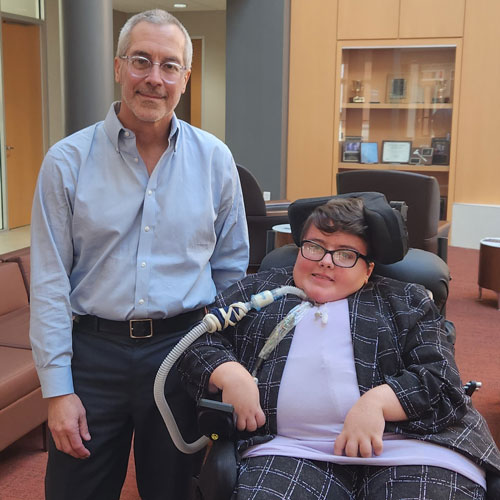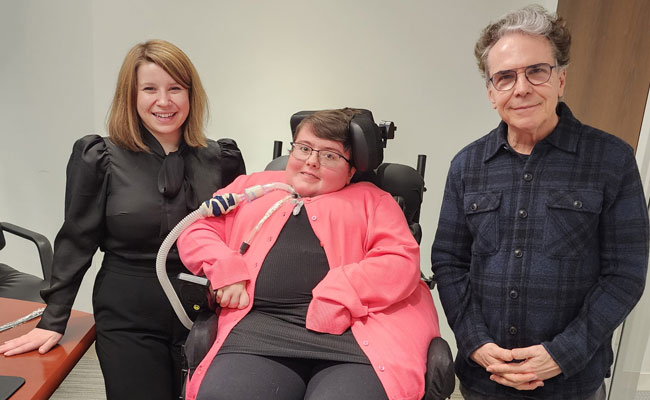Law student draws on personal experience for published law review note

Megan Parker in her summer associate office at Benesch Law. Photo: Jaclyn Sims
Megan Parker had already made her mark at The University of Akron during her undergraduate days as Editor-in-Chief of the student newspaper, the Buchtelite. She has continued to add to her CV since she began law school in August 2020, despite being physically disabled from birth and dependent on a ventilator, power wheel chair, and full-time caregiver (her mother Jaclyn Sims).
Parker’s latest accomplishment is to have her law review note, “Outdated, Archaic, and Stereotypical: Current Medicaid Income and Asset Limits Discriminate Against Working Individuals with Disabilities,” published in the DePaul Journal for Social Justice. The article draws on her own personal experiences to argue that, while Congress explicitly stated in the Americans with Disabilities Act of 1990 that the United States’ goals “regarding individuals with disabilities are to assure equality of opportunity, full participation, independent living, and economic self-sufficiency for such individuals,” essential Medicaid and Social Security programs remain in direct conflict with these goals, to the serious detriment of many permanently disabled people like herself.
Now in her third year, Megan is president of the Moot Court Honor Society, an associate editor of the Akron Law Review, a Legal Writing fellow, and active in the Trademark Clinic. She was a semifinalist in the 2021 ABA National Appellate Advocacy Competition, and she’s won CALI Awards for having the highest grade in five different classes. She will graduate with a Juris Doctor (J.D.) and a Master of Laws (LL.M.) in intellectual property. In spring 2022, she completed a four-month virtual externship at the Copyright Alliance in Washington D.C.
“The law review note itself is impressive, but it’s also impressive that as a law student, she's getting this published,” said Assistant Professor George Horvath, Parker’s faculty advisor on the article. “There are really very few opportunities for law students to publish outside of their own school’s law review. And DePaul has always had a strong health law program, so getting this placed there is a real accomplishment.”
In fact, DePaul was one of several law journals Parker called to ask if they accepted submissions from students at other law schools before sending off her note to the ones that did. She got an offer to publish from DePaul three days later, which she accepted. She later received offers from four other journals.

Assistant Professor George Horvath with Megan Parker. Photo: Jaclyn Sims
A happy moment deflated
As Parker details in the article, she encountered the archaic Medicaid income impediments at what should have been the happiest of moments: receiving an offer to join Benesch, Friedlander, Coplan & Aronoff, an AmLaw 200 firm, as their 1L Diversity Fellow for summer 2021. She suddenly realized the income she would receive for the nine-week fellowship would be more than she is allowed to earn within a year to maintain her Medicaid insurance.
Moreover, she later learned that, under the law, all the income she will ever earn will need to go into an irrevocable Medicaid Payback Trust that she can have no control over. These trusts have fairly restrictive limits on what the money can be used for, Horvath noted. When she eventually passes away, any money in the trust would go to Medicaid to reimburse it for the services she received throughout her life. There was no choice: to accept the Benesch offer she had to create the trust.
“These rules are just ridiculous,” she said in an interview. “In order to get this government health insurance—which was created specifically for the elderly and people with disabilities—you can’t earn more than 28% below the poverty level. These rules were written in the 1980s, when there wasn’t all of the technology available today that allows disabled people to work at the same capacity as able-bodied people.”
Parker didn’t know much at all about Medicaid and Medicare when she started her research.
“Assistant Professor and Law Librarian Sarah Starnes helped me look for relevant case law and research how this type of trust got created,” she recalled. “I had posted on the Ohio Bar Association's community page asking attorneys in disability law and elder law for some ideas, and a couple of them told me, you have no idea the amount of research that you're getting yourself into.”
Back to Benesch
Parker was invited back to Benesch as a summer associate in 2022 and has now accepted an offer to join the firm as a full-time associate this fall.
“My first summer, we had no idea what we were getting into. But Benesch completely blew us out of the water with how accommodating they were about my mother having to be with me all the time. We were able to participate in all the social activities and family-oriented events. I’ve never once felt like I was the odd one out.”
She recalled a fortuitous encounter early in her first summer at Benesch with Mark Avsec, vice chair, Innovations, Information Technology & Intellectual Property (3iP) Practice Group.
“I met him outside the elevator as I was going back to my office. He introduced himself as one of the partners in the IP group. I said, ‘I’m a summer associate interested in IP.’ He said, ‘Well, let’s see if I can get you some work.’ An hour later, he emailed me with a research assignment.”
He gave her three more assignments that summer. When she returned the second summer, he had already submitted assignments specifically labeled for her. She ended up doing some 10 different assignments that summer.
“We’re really excited about having Megan join us in the fall in the intellectual property group,” Avsec said. “She is an IP lawyer through and through. Her research skills are very good, and she’s a great writer. We have approximately 35 lawyers in the IP group spanning the Cleveland, Columbus, Chicago and San Francisco offices, and great clients, so Megan is going to get some really sophisticated work to do.”

Parker with Benesch Associate Lidia Mowad and Partner Mark Avsec. The three call themselves the Copyright Club Photo: Jaclyn Sims
Harvard Law’s loss
When Megan was in third or fourth grade, she came home one day and told her mother she wanted to be a lawyer and go to Harvard—like Elle Woods from Legally Blonde, Megan’s mother recalled.
“I told her then, if you get accepted, we’ll move the whole family to Boston. So, when it came time to start applying to law schools, I asked her if she was applying to Harvard, and she said no. I said, why not? You’ve wanted to go to Harvard your whole life. And she said, because she didn’t like New England Patriot fans.”
Today, obnoxious Patriot fans notwithstanding, she feels like she made the right choice in going to Akron Law.
